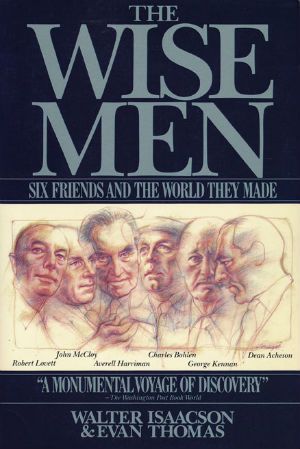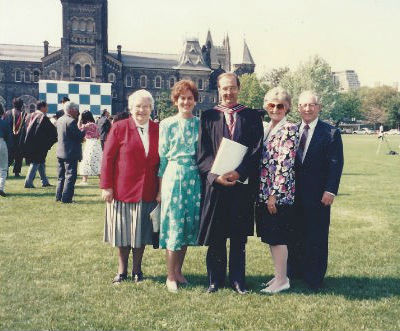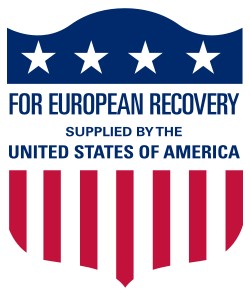The Marshall Plan…and Me
By Neil Earle
 My adolescent heroes George Kennan and company, the men who built the present world order now under reconstruction.
My adolescent heroes George Kennan and company, the men who built the present world order now under reconstruction.The Marshall Plan.
How could I forget it?
But I did. There it was, its 70th anniversary staring me in the face in the October 7, 2018 Memphis Commercial Appeal from my new home town of Memphis, TN.
“European Recovery”
It was in 1947 that U.S. Secretary of State George C. Marshall proposed for President Harry Truman, a major reconstruction program for European nations devastated by the effects of World War II and a horrendous winter that year.
Titled the European Recovery Program (ERP), known popularly as “the Marshall Plan,” Truman and Marshall proposed a $12 billion four year program of aiding participating European states to rebuild their economies.
This much is well-known. What is not so well-known were the benefits to America of not only a strategic zone free of Soviet Communism (Communist parties were threatening to take over Italy and France) but also a Western Europe integrated into an American-style mixed capitalist economy where “America exported and Europe bought” – a ready market for U.S. farmers and factories.
Congress stalled. Until the Soviets engineered a coup in neutral Czechoslovakia in 1948. Truman took this chance to beat the drum of anti-Communism calling for action and suggesting to reimpose the draft. The Marshall Plan passed. It succeeded splendidly in its goal to “strengthen centers of resistance to Communism” in the words of esteemed strategist George Kennan. The injection of about $12 billion into war-torn Europe “helped the Europeans help themselves” in the best American tradition. Confidence and hope were restored in Western Europe and the most strategic zone for U.S. interest was secured.
Even the Russians attended the founding conference for ERP but balked at disclosing economic information to American planners.
 June, 1992 at U of T with wife and friends.
June, 1992 at U of T with wife and friends.“Let Neil do it”
How do I feel connected to this thrilling venture in American diplomacy?
Well, I grew up in the lee of those thrilling and dangerous times when men such as Marshall, Acheson, Eisenhower, Churchill and MacArthur walked the earth. I could relate to them in undergrad history at Memorial University and in 1992, while finishing my last MA class in U.S. Foreign Policy at the University of Toronto, I reconnected. It was a graduate seminar and the first book on the docket was Michael Hogan’s The Marshall Plan, a fine reappraisal of ERP covering all the nuances.
My twenty-something classmates balked at reading this text and no one wanted to report on it. Too dry. Too abstruse. Seemingly irrelevant after the fall of the Iron Curtain in 1989.
Frankly I was starting to feel the same way but the class consensus was “let Neil do it. He’s the oldest guy in the class. He remembers that stuff.”
Well, I didn’t actually, being born in 1947 but, looking at the rest of the books on the list, I thought, I know this, I’ll do it.
Yeah, the Marshall Plan and me.
Of course reporting on Hogan gave me the chance to relive those thrilling days of the early Cold War, the Truman Doctrine (supporting countries such as Turkey and Greece struggling against Communist subversion), the building of the military alliance known as NATO, the Berlin Airlift, the fall of China to Communism and the Soviet A-Bomb – all squeezed in between 1946 and 1950 climaxing with Korea. Exciting times but times I could barely recall except through the song “All Soldiers Never Die” being on the hit parade after General MacArthur’s great speech to Congress in 1951 after being relieved in Korea.
The early Cold War. Significant times. In 2017 at the anniverasry of the Marshall initiative I gave a well-attended lecture at Duarte Public Library in California on a steaming hot Sunday PM on this very subject. It was titled “The World America Made” as people were trying to get background on the issues such as a possible new Cold War facing Americans today.
 The Marshall Plan of 1947 injected $12 billion into war-torn Europe to "help the Europeans help themselves."
The Marshall Plan of 1947 injected $12 billion into war-torn Europe to "help the Europeans help themselves."History’s Shifting Kaleidoscope
Here’s the funny thing about history. It never goes away. President Donald Trump has put NATO and European economic relations back once again on the international agenda. The respected conservative commentator Newt Gingrich has summarized the issue in these New Cold War times: “So we helped rebuild Western Europe ($162 billion in today’s monies). We could afford to do this because we had virtually no competition on the world stage…That was OK for the thirty-five years that followed the war. Our national debt stayed relatively flat until 1980, our production more than doubled in that time and our debt lowered from 116% in 1946 to about 32%...That started to change toward the end of the last century. The rebuilt world was waking up.”
Newt was joined in this analysis by such liberal commentators as Fareed Zakaria in The Rise of the Rest. So the Marshall Plan still matters. It is a barometer to changing times, a recall to an era that no linger exists, a benchmark from the US at its greatest peak and a marker for how much has changed today – and how much remains the same.
And what’s a spritual takeaway needed from this article? That immensely important command to be thankful. Thank you Michael Hogan, thank you U of T grad class for tuning me in to the Big Stories that never really go away. Thank you all my history teachers who have been so great and upbeat. So thank you Graham Newell, Elmo Piercy from high school, Mrs. Coleman, Dr. Bassler and Dr. Jim Tague at Memorial University of Newfoundland, Ernest Martin and Herman Hoeh at Ambassador College, and Bob Accinelli, Paul Rutherford, Bill Berman, Jacob Vandermuelen, David Lewis, David Sheinin, and Ron Pruessen at U of T. There’s also John Thompson, Mel Robeck and Colin Brown at Fuller. Thank you all for so enriching my life and making me feel at least that I have been an eyewitness to history. Thank you all my good students at Citrus College and Grace Communion Seminary. History matters! It expands horizons, gives us alternate ways to view reality and makes us better conversationalists on current events for sure.
One Proverb we quoted in our church was, He who walks with wise men will be wise. History makes men wise, Francis Bacon wrote in the 1600s and it never grows old. History keeps you current as it a running argument with the Present as the Marshall-Truman initiative in Europe shows. It was shrewd old Harry Truman who said, The only thing new under the sun is the history you haven’t read yet. It’s a life lesson I try to pass on wherever I go. Now you’ve read it yourself.
(Neil currently teaches history online for Grace Communion Seminary.)